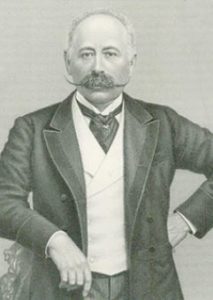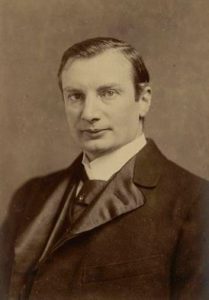Moses of the 19th Century
 Moritz Tzvi von Hirsch auf Gereuth (1831-1896) was born in Munich to a wealthy German-Jewish family. His grandfather was a banker for the Bavarian king, and became the first Jew to be permitted to own land in Bavaria. His father also served as the court banker, and became a German baron. Hirsch studied in Brussels, then took a banking job himself at age 17. Years later, he branched off on his own, eventually making his fortune from sugar, copper, and railroads. One of his boldest projects was building a Vienna-to-Istanbul rail line. Hirsch settled in Paris where he lived for the remainder of his life, going by the French version of his name, Maurice de Hirsch. In 1860, the Alliance Israélite Universelle (Kol Israel Haverim) organization was founded in Paris to secure human rights and education for Jews around the world. Hirsch became their biggest supporter, essentially bankrolling their operation to the tune of several hundred thousand pounds a year. The organization was most famous for building Jewish schools, including the first schools in pre-State Israel. The Alliance schools were also the first to teach a Hebrew curriculum, playing a key role in the language’s revival. Hirsch also donated countless sums to schools and hospitals across Germany, France, and England. He paid for the renowned Pasteur Institute’s entire biochemistry building. In the last two decades of his life, Hirsch was devoted to easing the plight of Russian Jews. He founded the Jewish Colonization Association in 1891 with a starting budget of £2 million pounds. The money was used to resettle Eastern European Jews in the Americas (particularly in Canada and Argentina), as well as in Ottoman Palestine. Altogether, Hirsch donated £18 million to the organization, the equivalent of about $4 billion today! Needless to say, it played a massive role in getting the Zionist movement off the ground and re-establishing a Jewish state in Israel (though de Hirsch himself didn’t believe it would ever actually happen!) as well as saving countless lives from pogroms and oppression. Maurice de Hirsch is ranked among the most generous philanthropists of all time. His wife, Clara de Hirsch, is also on this list, in her own right. She came from a wealthy banking family, too, and donated another 200 million francs of her own funds. When the couple tragically lost their only son in 1887, Maurice de Hirsch declared: “My son I have lost, but not my heir; humanity is my heir.” For his efforts to launch a mass-exodus and liberation of Jews, he has been called the “Moses of the 19th Century”.
Moritz Tzvi von Hirsch auf Gereuth (1831-1896) was born in Munich to a wealthy German-Jewish family. His grandfather was a banker for the Bavarian king, and became the first Jew to be permitted to own land in Bavaria. His father also served as the court banker, and became a German baron. Hirsch studied in Brussels, then took a banking job himself at age 17. Years later, he branched off on his own, eventually making his fortune from sugar, copper, and railroads. One of his boldest projects was building a Vienna-to-Istanbul rail line. Hirsch settled in Paris where he lived for the remainder of his life, going by the French version of his name, Maurice de Hirsch. In 1860, the Alliance Israélite Universelle (Kol Israel Haverim) organization was founded in Paris to secure human rights and education for Jews around the world. Hirsch became their biggest supporter, essentially bankrolling their operation to the tune of several hundred thousand pounds a year. The organization was most famous for building Jewish schools, including the first schools in pre-State Israel. The Alliance schools were also the first to teach a Hebrew curriculum, playing a key role in the language’s revival. Hirsch also donated countless sums to schools and hospitals across Germany, France, and England. He paid for the renowned Pasteur Institute’s entire biochemistry building. In the last two decades of his life, Hirsch was devoted to easing the plight of Russian Jews. He founded the Jewish Colonization Association in 1891 with a starting budget of £2 million pounds. The money was used to resettle Eastern European Jews in the Americas (particularly in Canada and Argentina), as well as in Ottoman Palestine. Altogether, Hirsch donated £18 million to the organization, the equivalent of about $4 billion today! Needless to say, it played a massive role in getting the Zionist movement off the ground and re-establishing a Jewish state in Israel (though de Hirsch himself didn’t believe it would ever actually happen!) as well as saving countless lives from pogroms and oppression. Maurice de Hirsch is ranked among the most generous philanthropists of all time. His wife, Clara de Hirsch, is also on this list, in her own right. She came from a wealthy banking family, too, and donated another 200 million francs of her own funds. When the couple tragically lost their only son in 1887, Maurice de Hirsch declared: “My son I have lost, but not my heir; humanity is my heir.” For his efforts to launch a mass-exodus and liberation of Jews, he has been called the “Moses of the 19th Century”.
Words of the Week
I suppose I shall spend all my money in this movement. But, after all, what is the use of money unless you do some good with it?
– Baron Maurice de Hirsch

